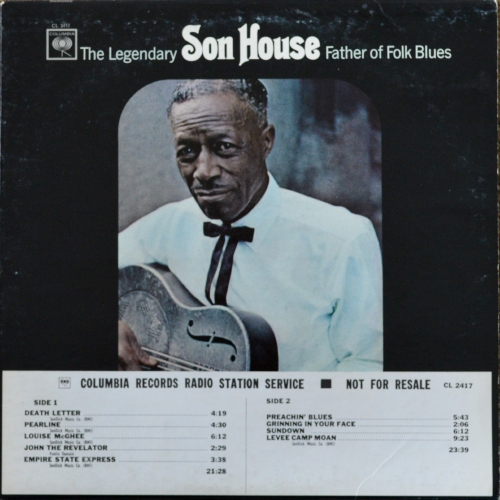

Artist: Eddie J. "Son" House, Jr.
Title: The Legendary Son House Father of Folk Blues (White Label Promo)
Year: 1965
Eddie James "Son" House, Jr. (March 21, 1902 [1][2] – October 19, 1988) near Clarksdale, Mississippi was an American blues singer and guitarist,
noted for his highly emotional style of singing and slide guitar playing.
After years of hostility to secular music, as a preacher, and for a few years also as a church pastor, he turned to blues performance at the age of 25.
He quickly developed a unique style by applying the rhythmic drive, vocal power and emotional intensity of his preaching to the newly learned idiom.
In a short career interrupted by a spell in Parchman Farm penitentiary, he developed to the point that Charley Patton, the foremost blues artist of
the Mississippi Delta region, invited him to share engagements, and to accompany him to a 1930 recording session for Paramount Records.
Issued at the start of The Great Depression, the records did not sell and did not lead to national recognition. Locally, Son remained popular, and in
the 1930s, together with Patton's associate, Willie Brown, he was the leading musician of Coahoma County. There he was a formative influence on Robert Johnson and Muddy Waters. In 1941 and 1942, House and the members of his band were recorded by Alan Lomax and John W. Work for Library of Congress and Fisk University. The following year, he left the Delta for Rochester, New York and gave up music.
In 1964, a group of young white record collectors discovered House, who they knew of from his records issued by Paramount and by the Library of
Congress. With their encouragement, he relearned his style and repertoire and enjoyed a career as an entertainer to young white audiences in the
coffee houses, folk festivals and concert tours of the American folk music revival billed as a "folk blues" singer. He recorded several albums, and
some informally taped concerts have also been issued as albums. Son House died in 1988.[4]
In addition to his early influence on Robert Johnson and Muddy Waters, he became an inspiration to John Hammond, Alan Wilson (of Canned Heat),
Bonnie Raitt, The White Stripes, and John Mooney.
Aptly titled, Father of Folk Blues chronicles the father of what we know as the blues that artists like Robert Johnson and Muddy Waters are more famous
for and Captain Beefheart, The Rolling Stones, Eric Clapton, etc. all got famous for has significant roots with Son House.
By the time of 1965 House had composed all of his masterpieces, all of which end up here. There is the classic death blues ballad of “Death Letter”
and the loving “Pearline”. There is the a capella spiritual “John the Revelator” and the anti-spiritual “Preachin’ the Blues” of a corrupt preacher
(see also “Jimmy Bell” by Cat Iron). The a capella optimistic snarky blues exorcism of “Grinnin’ in Your Face” is the soul of everything Beefheart did.
Then there are the downhearted blues of “Sundown”, “Levee Camp Moan”, and “Downhearted Blues” that are the staple of half of every blues track composed
after 1950, particularly by the whites who profited off of it.
Track Listing:
1. Death Letter
2. Pearline
3. Louise McGhee
4. John The Revolator
5. Empire State Express
6. Preachin' Blues
7. Grinning In Your Face
8. Sundown
9. Levee Camp Moan
Rip Info:
Thorens TD 125 MK II
Audio-Technica - AT30HE MC Cartridge
Audioquest Head shell Leads
TP 60 Tone Arm
NAD Phono Preamp PP2
Audioquest Sidewinder Interconnects
Direct into: Xonar D1 Soundcard
Wavelab 6.1 recorded at 32 bit float 192 kHz
iZotope RX 2
Track Labeling and conversation to 24bit 192 kHz in Foobar2000
Silence added between tracks. No Denoise.